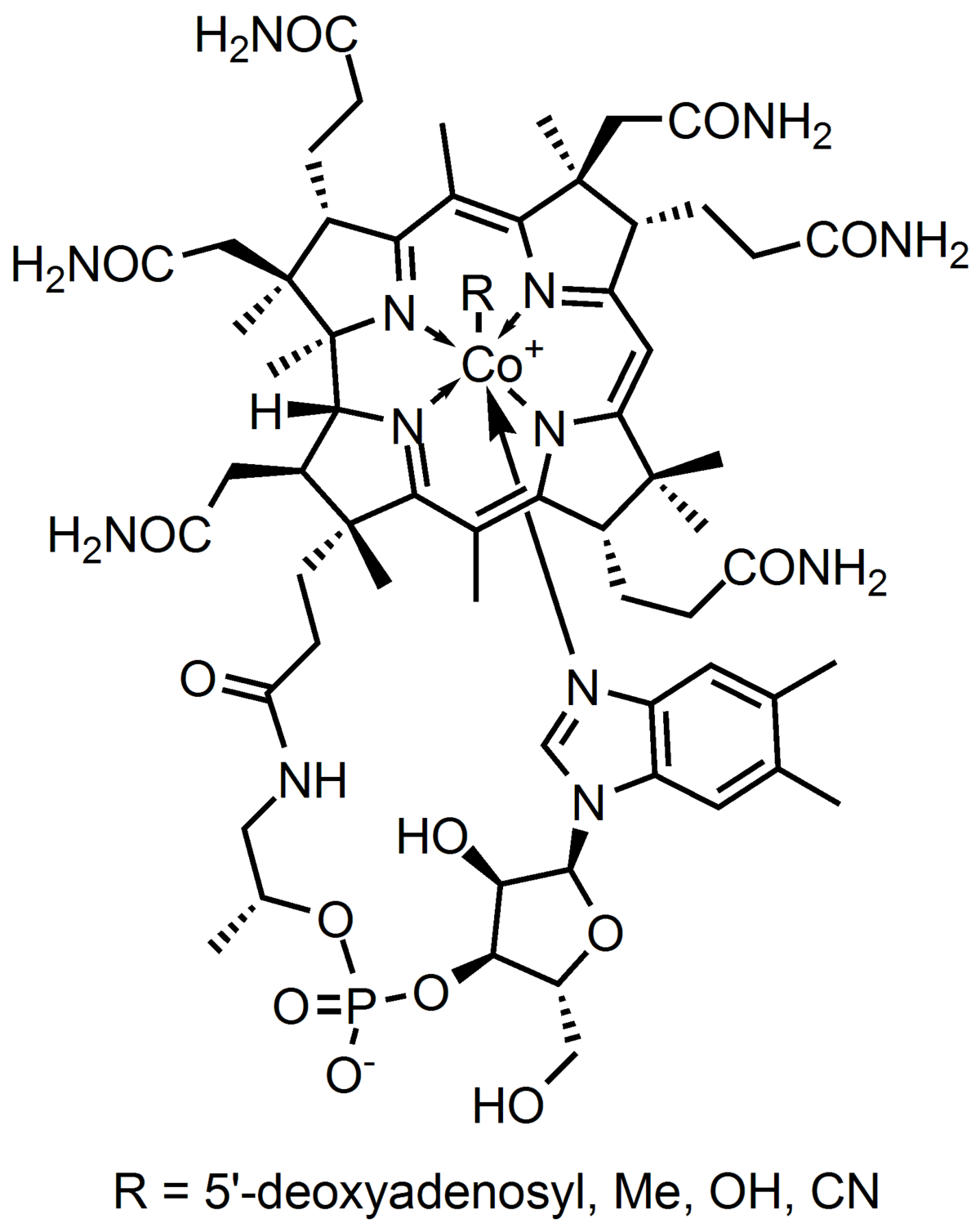
Représentation of the vitamin B12 molecule above
Points addressed :
What every vegan and any person going towards a plant-based diet (flexitarian, vegetarian, vegetalian) must know
Researches have shown that plants contain all essential nutrients for humans except one : the vitamin B12. But there is a good news.
All B12 vitamin available in the food chains come from a production from micro-organisms. No known plant or animal can produce it. The first does not need it, the later gets it directly or indirectly from bacteria because it needs it.
The B12 vitamin and its bacterian origin were discovered on the 12th of December 1947 (by Edward Rickes, researcher at New-York). Thanks to this discovery, human can do the culture of bacterias to get the B12 from its primary source. Thus, from 1948, Humanity can be vegan and live as long in good health.
B12 vitamin is vital to our body.
IMPORTANT : Every person Following a vegan or vegetalian diet must take a supplement of vitamin B12. Despite some speculations, it is not possible and it has never been possible for humans to get their B12 endogeneously (that is from flora of the digestive system) or through soil or water. Calculations have been made by the Vegan Federation in France and one would need to eat 7 kilograms of pesticide-free soil per day or drink 100 liters of unpolluted water per day to have a chance to get enough B12, and these quantities would just kill us (source in french).
The recommended form of vitamin B12 for supplementation is cyanocobalamin. Indeed, there is no superiority of any of the four forms of vitamin B12 (cobalamin being the main and common part of the molecule) that are bioavailable for humans (adenosylcobalamin or AdoCbl, cyanocobalamin or CNCbl, hydroxylcobalamine or HOCbl, methylcobalamine or MeCbl), and cyanocobalamin is the more stable form among them, so it is the most reliable for supplementation. It is also the less costly to produce, since the other forms in supplements are made from cyanocobalamin (source : comparative study). It is an error to think that some forms would be more active : eventhough some forms are used in our body, the intakes are never used directly, the adeno-, cyano-, hydroxyl-, methyl- parts are first cut off the cobalamin main part, then the site using the vitamin B12 will add the terminal bond it wants.
Quantities of vitamin B12 to take :
- 1 mcg three times a day
- or 10 mcg once a day
- or 2000 mcg once a week
- or 5000 mcg once every two weeks
IMPORTANT : it is highly recommended for vegetarians and flexitarians to take a supplement of vitamin B12, as per the instructions above for vegans, because it is easy to not get enough B12 from only dairy products, knowing that eggs are not a reliable source of B12 (source - one would need to eat around 30 eggs a day) and there is no toxic level of vitamin B12 in oral supplementation (source EFSA).
The vitamin B12 deficiency
Symptoms
The B12 vitamin being part of many important processes (formation of blood cells, protection of both central and peripheral nervous sytems, repair and synthesis of DNA, recycling of wastes from our cells), there is a large range of symptoms that can be linked to a vitamin B12 deficiency, without being specific to it :
- anemia
- anorexia
- confusion;
- nervous system deterioration
- abnormal gait
- dementia
- depression
- diarrhea
- back and limbs pain
- collapse of immune defenses, etc.
- numbness (beginning of paralysis)
- breathlessness;
- tingling
- hallucinations
- irritated or degraded tongue
- faulty memory
- palpitations
- Partial or total paralysis (hands, feet, then the rest)
- paranoia, irritability, change of personality
- loss of energy
- loss of sensitivity to pain and pressure (onset of paralysis)
- sleep loss
- progressive deafness
- tachycardia
- blurred vision and progressive blindness
Diagnosing a B12 deficiency
The indicated analysis, in case of none supplementation or symptoms of deficiency despite some supplementation (probably related to absorption problems or inadequate way of supplementation), is the methylmalonic acid test of urines. Indeed, the other methods can be not reliable. Thus, for example, a direct B12 blood test, with people on a plant-based diet, can miss a B12 deficiency and showing a normal result instead, because people who are reluctant to complementation tend to consume some sources of vitamin B12 analogues (B12-like molecules non active for humans) that distort the result. Another method, blood homocysteine level analysis can also be skewed by high consumption of folate sources. (source in french)
Cure for B12 deficiency
In order to quickly increase the vitamin B12 stocks and to get rid or reduce symptoms that would be linked to vitamin B12 deficiency, we can recommend a cure period, with one of the following dosages :- 1000 µg every day for 2 months
- ou 2000 µg once every 2 days for 2 months
- ou 2000 µg everyday for 1 mpnth
- ou 5000 µg once every 5 days for 2 months
- ou 5000 µg everyday for 12 days.
Once the cure is completed, the normal supplementation must continue for life (as indicated here).
More sources
- The open letter What Every Vegan Should Know about Vitamin B12
- The world B12 day, by the Vegan Federation (Fédération végane in french)
- EPIC-Oxford comparative study
- Source 1 related to deficiency among vegetarians
- Source 2 related to deficiencey among vegetarians
- Source 3 related to deficiencey among vegetarians
- Source 4 related to deficiencey among vegetarians

